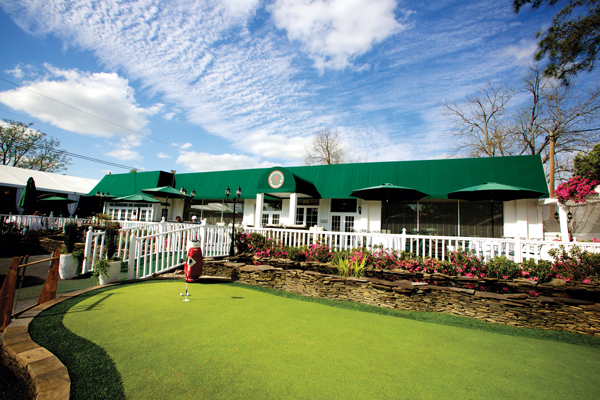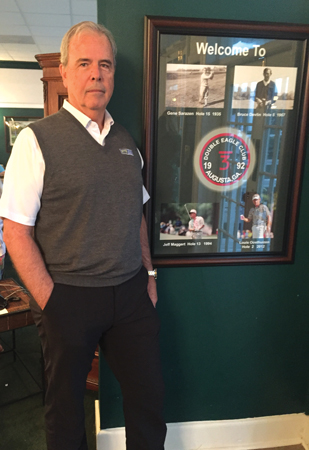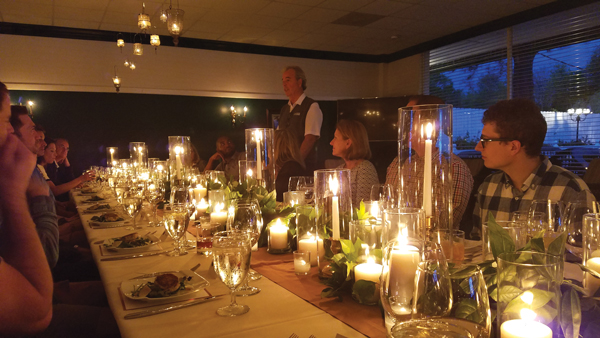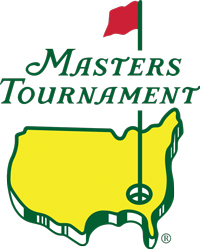 |
Photo: COURTESY OF INTERSPORT
|
The Double Eagle Club is normally quiet on Wednesday afternoon before the Masters. Most of the guests go to the golf course to watch the Par-3 Tournament.
But with it raining sideways the day before golf’s opening major, patrons were hustling back to the Double Eagle’s hospitality facility across the street from Augusta National to dry out.
“Tornado party. Who needs a drink?” the Double Eagle bartender shouted.
Long before swanky Berckmans Place debuted on Augusta National property or any of the hospitality houses that line Washington Road in Augusta came along, there was the Double Eagle Club, founded in 1992 by the Chicago agency Intersport.
Now in its 26th year, the high-end hospitality at Double Eagle is a Masters institution. On the Wednesday before the tournament, guests ranged from pro golfer Colin Montgomerie to TV analyst and event management company founder Peter Jacobsen, ESPN executive Burke Magnus, and a covey of Under Armour higher-ups.
The guy who leads it all is Charlie Besser, who founded Intersport 31 years ago. With the buzz of the “tornado party” behind him and rain pelting the windows of the Double Eagle, Besser talked for nearly an hour about his favorite Masters memories, Intersport’s broad horizon and why he’s never been tempted by offers to sell the company.
 |
Hospitality is a sliver of Intersport’s business, Besser says, but its hospitality space across from Augusta National is a keeper. “We’ll always do this,” he says.
Photo by: MICHAEL SMITH / STAFF
|
I think about being introduced here for the first time by Ken Venturi in 1991, and I had lunch at Augusta National because of his introduction. I went over to ask their permission to produce a one-hour television show previewing the Masters.
I thought it was a 1-in-1,000 shot, but as I got up from the table, they said, “Charlie, we’re going to do this.” I was shocked. I didn’t walk out of the building, I floated out.
After I had been on the golf course for the first time, I noticed that there was no on-course hospitality. So I called Augusta National and asked if they had any intention of creating something. They said absolutely not. Then I asked if they’d mind if I did it. They said go for it.
The first year we called it the Augusta Club — they didn’t like that. So I sent over three names and let them pick, and they picked Double Eagle Club, so Augusta National actually named it. That’s how we started.
We did two years of “SportsCenter” live from Double Eagle, early, early on. … Most people don’t know this, but I was sitting here with (former ESPN executive) John Wildhack one day and realized that nobody at ESPN knew anyone at Augusta National, so I arranged a lunch and made the introduction, which led to ESPN getting the rights. It only took 10 years from the lunch until the time they were awarded the rights.
I remember Ricky Barnes, as a student at the University of Arizona, and he’s leading the golf tournament. He comes running across the street and asks if we had any computers. He said, “I’ve got a paper due and I thought I’d be going home.”
Half of [Intersport’s] business is sponsorship and event marketing and half of our business is media-based — content, whether in the form of live events, short-form digital or television. Hospitality is less than 1 percent of our business. Now, we’re never giving up the Double Eagle. We’ll always do this, but it’s really more of an outgrowth of our business. The people who are here are our partners, like ESPN, CBS, Under Armour, KPMG, on and on.
One thing we’re doing is opening this for the Peach Jam [summer basketball showcase]. So many college coaches go to that and there’s no place for them to go. It’ll be a blast to have those guys in here.
We’ve been able to help a number of charities because when you offer a trip to the Masters at a charity auction, those go for a lot of money. We’re well north of $5 million for charity by donating Masters trips.
We look at our business almost like a private equity. We’ve got really stable businesses, and then we decide what we’re going to invest in. Our big investments are in leadership, culinary and esports. When we invest in something, it’s like creating a new vertical.
We’ll do culinary events, culinary content, short-form digital, programming, marketing-based tours, experiential. It almost becomes a company unto itself. We’re doing the same thing with leadership. It’s a huge space. And in esports, we’ll do the same thing — national events, tons of content. Television, we’ll have to see how that works. We’re testing and learning that space; it’s very complicated. But everyone wants to have a conversation about esports.
Fear is the way the universe shows you the path. Every time I’ve been afraid of something, and I mustered the courage to do it, it was 100 percent the way to go. And when I cave to my fears, I feel miserable.
My idols are guys like Rupert Murdoch, who’s getting it done at 84. I don’t know what else I would do. I love our people. It keeps me young being around so many smart people.
 |
Photo: COURTESY OF INTERSPORT
|







